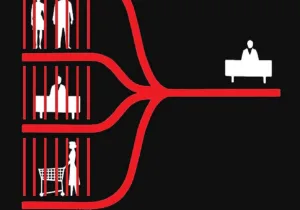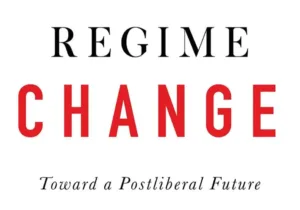Patrick Deneen’s 2014 article, “A Catholic Showdown Worth Watching,” now seems like ancient history. Its observations about the divide between Americanist Catholics like George Weigel and “more radical” voices like David L. Schindler now seems remarkable for how mild the confrontation was. Deneen’s own Why Liberalism Failed (2017), combined with the traction integralists have gained among American Catholic intellectuals indicates an escalation from academic debate to insurgency.
On the other side of the Tiber another debate is surfacing. Evangelicals in the academy on the left and right are re-examining classical liberalism and the American Founding in ways unheard of before the election of Donald Trump. Particularly after several years of left-leaning academics finding evangelicals complicit in the sins of American nationalism, some are questioning the value of bringing overt political advocacy into such scholarly writing. This debate might well be another phase in overcoming the scandal of the evangelical mind.
Monitoring this debate is easier if you belong to evangelical academic networks. That wing of American higher education has been in marked decline after the retirement of such notable historians as George M. Marsden, Mark A. Noll, Harry S. Stout, and Grant Wacker. Those older scholars were part of (and helped to create) a network of institutions that led Alan Wolfe to write a cover story for the Atlantic on the opening of the evangelical mind.
Now, evangelical scholars network at The Anxious Bench or the Conference on Faith and History. Many teach at evangelical colleges and universities that have faced significant declines in budgets and enrollments. What used to be the bright, shiny object of the evangelical mind has become the equivalent of the flip cell phone with antennae.
Evangelical scholars have appeared to maintain intellectual standards by writing books that explain the hypocrisy of fellow Protestants voting for Donald Trump. Jemar Tisby’s The Color of Compromise, John Fea’s Believe Me, and Kristen Du Mez’s Jesus and John Wayne seemed to keep alive the scholarly tradition of the older evangelical historians. But most of these post-2016 books have used the present (race relations, Trump’s presidency, sexual abuse scandals in churches) to reinterpret evangelical history. Rather than deepening existing lines of scholarship, they look at the past as the forerunner of today’s headlines.
That presentism in evangelical scholarship accounts for Jay Green’s (Covenant College) recent effort to map the political outlooks of fellow scholars and evangelical thought leaders. He uses two spectrums to diagram contemporary evangelical politics: first,“Emancipatory” vs “Civilizational,” which describe the difference between social justice and culture war Protestants, respectively. Second, Protestants can be differentiated by their willingness to go against the institutions of liberal democratic procedurals, where are “Maximalists” are the most willing to overturn liberal proceduralism while “Minimalists” have the utmost regard for liberal democracy, whether they are civilizational or emancipationist.
Green touched a nerve when he identified Kristen Du Mez (Calvin University), arguably the most successful in book sales, as an Emancipatory Maximalist (EM). Green contends that EM’s are illiberal because they seek to eliminate evils from society irrespective of liberal or constitutional procedures. Du Mez countered that she has always sought the “protection of liberal norms and institutions.” She adds that her aim is always to “elevate the discourse.” Readers of the subtitle of her book, Jesus and John Wayne may wonder: “how white evangelicals corrupted a faith and fractured a nation.” Kevin DeYoung, whom Green identified as both a liberal proceduralist and a conservative culture warrior noticed that activism was taking a toll on the quality of evangelical scholarship.
Since the exchange, Green has apologized for naming Du Mez and John Fea, the editor of Current where Green’s piece appeared, has also backed away from provocations that could disrupt collegiality. This imbroglio could turn out to be a nothing burger.
But coming as it does in the midst of Stephen Wolfe’s The Case for Christian Nationalism, Green is defending liberalism precisely when evangelicals need reminders about the virtues of liberal procedures and institutions. Of course, the US Constitution may not inspire patriotism any more than large corporations inspire loyalty. Still, the Constitution is a remarkable political formulation in the history of the West for restraining government and ensuring liberties. Contemporary Christian frustrations with liberal polity for not sustaining Christian norms or not comforting afflicted members of society forget the hard won benefits of limited government and the duties of civil society. Evangelicals, who suffer from doses of Neo-Calvinism (often defective varieties) in which the assertion of Christ’s sovereignty over every square inch of creation is a recipe for “redeeming” everything and implicit justification for Christian nationalism, need reminders about classical liberalism. In the current climate, this recovery is all to the good.
Some may wonder whether Green is the best person to stand up for liberalism. In his explanation for speaking out, Green says that Trump’s threat to liberal norms was partly responsible for his awakening. “Prior to the election [2016], I naively took the institutions and ideals of liberalism for granted.” But after a president who “worked to undermine” the American polity, Green became even more resolute in his esteem for “the founding principles of the nation.”
Some Americans (me) who had reservations about Trump also worried about FBI probes, and assertions of Russian interference in a national election, not to mention what the (almost) Gelasian congruence of state power and public health did to basic American rights during the pandemic. Green’s own paper trail during COVID is blank but his editor (and friend) John Fea consistently minimized legal and political questions. Instead, he recommended neighbor love and mocked Christians who protested government restrictions on freedom of worship, speech, and assembly.
Despite these reservations, Green’s defense of liberalism comes at a time when few evangelicals are looking at the Founding and recommending it. Many are still caught up in the 1619 Project’s reverse American exceptionalism – an exceptionally wicked nation. In which case, Green’s modest support for liberalism may do for progressive evangelicals what Deneen did for integralist Catholics.






 Live in the DC area? Sign-up for Providence's in-person events list!
Live in the DC area? Sign-up for Providence's in-person events list!